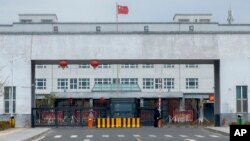In a recent speech, Chinese President Xi Jinping emphasized the need for China to continue what he called the “Sinicization of Islam” in the country’s Xinjiang Uyghur Autonomous Region.
The United States has other names for what is happening in Xinjiang to Uighurs and other predominantly Muslim ethnic minorities: crimes against humanity and genocide. The atrocities include forced labor, forced assimilation, forced sterilization, family separation, and internment in detention camps.
U.S. Ambassador-at-Large for Global Criminal Justice Beth Van Schaack noted the challenge to creating pathways to justice and accountability for perpetrators of the crimes taking place in Xinjiang.
“[I]t does not mean that we sit idly by or are silent. First, we must continue to call these atrocities by name: these are crimes against humanity and genocide,” she said. “[T]he world must stand firm against them both in word and in deed.”
Ambassador Van Schaack noted that documentation of the crimes perpetrated by the Chinese government in Xinjiang is “incredible.”
“Academics and independent researchers are scrutinizing policy directives and websites. Witnesses are sharing their experiences. NGOs [non-governmental organizations] are analyzing commercial satellite images of detention centers and destroyed Muslim cemeteries and mosques. Supply chains tainted with forced labor are being tracked and analyzed,” she said.
Ambassador Van Schaack said that documentation has been crucial to the U.S. response to crimes committed in Xinjiang. In 2021, the U.S. Congress adopted the Uyghur Forced Labor Prevention Act that established the presumption that goods mined or produced in Xinjiang are made with forced labor and are prohibited from U.S. importation.
In addition, since 2020, the United States has designated 12 persons connected with serious human rights abuses in Xinjiang under the Global Magnitsky sanctions program and has imposed visa restrictions on several PRC and Chinese Communist Party officials for their involvement in gross human rights violations in the region. The Department of Commerce has restricted dozens of Chinese entities associated with abuses in Xinjiang from accessing U.S. markets.
“We’ve also issued a Xinjiang Supply Chain Business Advisory to highlight the heightened risk to businesses with supply chains and investments in Xinjiang given the entities complicit in forced labor and other human rights abuses there and throughout China,” she said.
Ambassador Van Schaack said the United States will continue to lead the way in imposing costs on individuals and entities connected with atrocities committed in China and around the world.






